My sax buddy Pete Hales started a thread on the Woodwind Forum titled, What’s Wrong with this Bass?, in relation to a Beaugnier-made Vox bass saxophone that’s been on eBay for nearly a month. Based on the pics and description, it’s hard to see anything much wrong with this beastie…
Source: gearcrazymusic on eBay.com
The seller is a some kind of music store, and describes the horn like this:
The sax itself was made by Beaugnier in France was for Vox.
This horn was gone over by our in
house tech.
Any questions call 216 881 0599 ask for me ED in woodwind repair shoptried to take lots of close ups so you can see the condition.
plays fine, all keys, springs are tight.
pads as you can see, are like new, no leaky pads etc..
please feel free to call me or rick, our shop hours are mon-sat 10-6 pm e.s.t. ask for me ed or rick.
ser # 19653 ,
thank you.
The photos show a bass that does not appear to be beaten up, and in much better condition than saxophones less than half its size. (Note even the lack of dents in the bow—pictures 5 & 6.) It is also in much better shape than any of the Beaugnier-made bass saxes that I have collected images of for Bassic Sax Pix. Oh, and how many used horns—modern or vintage—still have their case keys?
So why hasn’t this Beaugnier-made Vox bass saxophone sold? Let’s try to unwrap the mystery…
Yes indeed, this baby looks to be in fine shape. The question that Pete asked, is why hasn’t it sold yet? A few people chimed in with ideas such as:
- Timing. Since the pool of potential buyers is small, perhaps no one is looking for a bass sax at this time.
- Beaugnier might be considered a off brand compared to Conn, Buescher, or JK.
- The brand might suck. (My word, not theirs.)
- The economy.
- Bass saxophones are not a necessity, so people might put off buying one, and buy necessities instead.
Ever since Pete started the thread a few days ago, I have been giving this Beaugnier-made Vox bass saxophone, as well as Pete’s questions some thought. I know a number of you who read my website own Beaugnier-made basses, and those of you who I have corresponded with say that you like your horns.
The fact is, whenever you put something up for sale, you’re always hoping to find that one buyer who is looking for that particular item. Unfortunately, since many (most) players don’t have the ability to play test a bunch of bass saxophones before they buy them, they have to go on what others are saying about brand X, Y, & Z. As players we are also limited to availability, and often to a price range.
Sure, I might love to buy an Eppelsheim bass, but do I have the cash to do that? Maybe not, so I settle on a brand or style of vintage bass that is recommended by players on forums, or better yet, The Bass Sax Co-op.
And that’s a wrap
Since there are far less Beaugnier-made bass saxes out there than vintage American ones, you will likely always get more players recommending the Conn and Buescher brands than Beaugnier. Adding to that discussion is the issue of wrap design.
Beaugnier are short wrap horns, like the Selmers. Some players have argued that their sound is more like that of a big bari, and lacks that deep, sonorous American style sound found in Buescher, Conn, and Keilwerth. The late Bear, who owned Cybersax, described wrap this way:
By ‘wrap’ we refer to the spots at which the instrument’s designers choose to place the bends in body tubing in order to produce an instrument with keywork that is both mechanically efficient AND ergonomically ‘friendly’ to the player. Compared to the American bass saxophones [the] Selmer…design produces a little ‘tamer’ sound, probably more suited to classical (think a bowed string bass) or ‘legit’ applications than to roaring out lines we associate with the modern electric bass.
I have watched a number of auctions and sales of Beaugnier-made bass saxophones over the years, and none of them sell as quickly as vintage American basses. Furthermore, they tend to carry a price tags under those we see on vintage Conns and Bueschers, and certainly under Keilwerths. Needless to say they also are listed for far less than Selmers.
To see a comparable to this Beaugnier-made Vox bass saxophone currently for sale on eBay, check out this Noblet bass that PM Woodwind has had listed for quite some time. This Beaugnier-made bass sax #15863 is available for $5,895.00.
In conclusion then…
I’m very curious to get some input from you about what I’ve written. Have I missed the mark altogether? Is anyone reading this currently looking for a bass? If so, what kind are you looking for? Would you consider a Beaugnier?
If you are considering the lesser-known French brand, the auction for this Beaugnier-made Vox bass saxophone currently on eBay is scheduled to end in two days (January 28). The Buy It Now price is $6,499.00 US. 20 people are watching the auction, but I’m one of them, so count me out, since I’m not a potential buyer. So had most you have 19 potential buyers watching this auction. It will be interesting to see if anyone buys this at the last-minute.

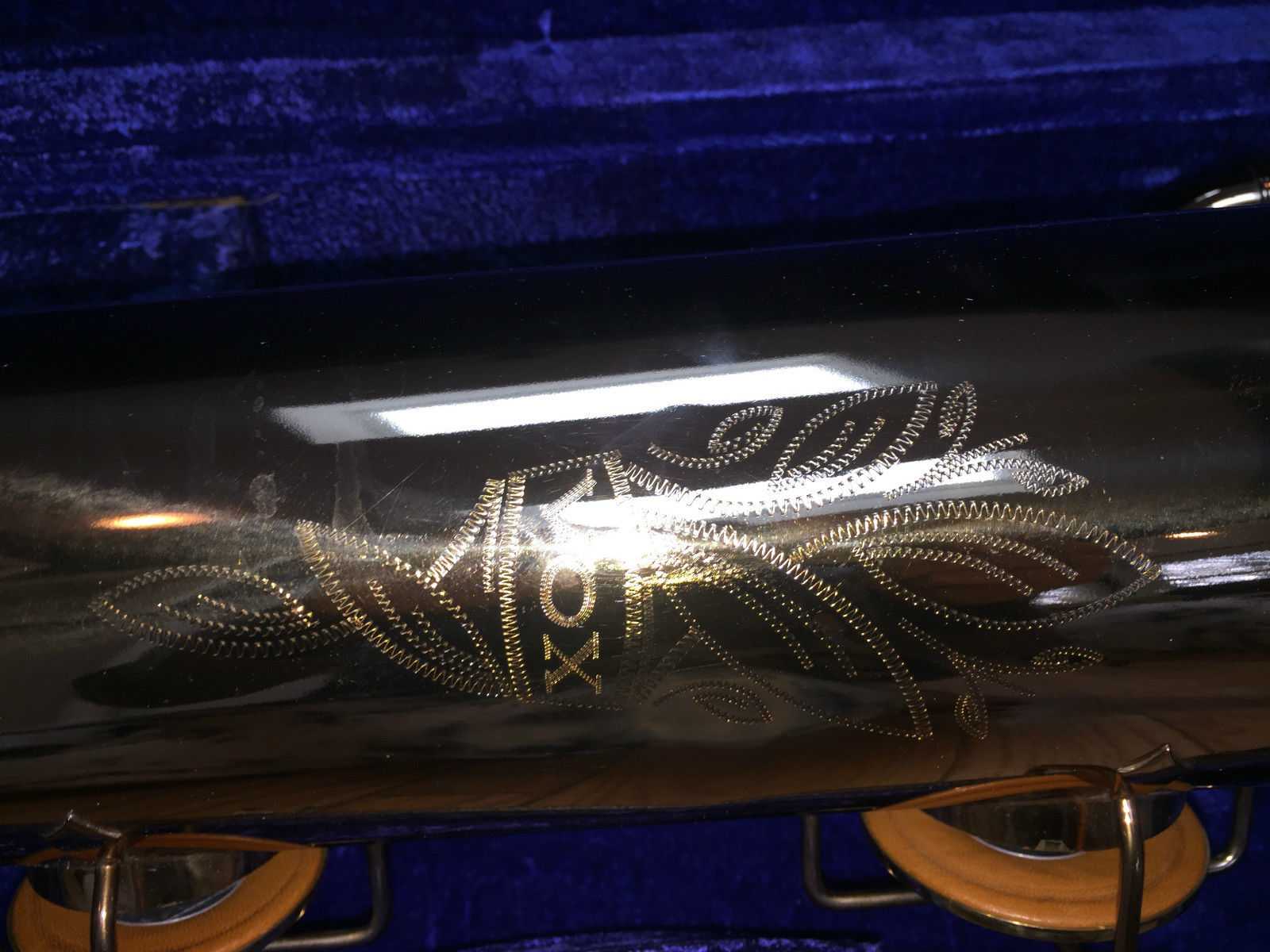
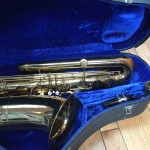
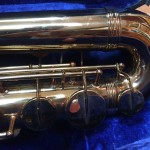
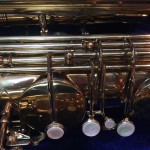
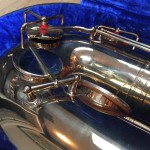
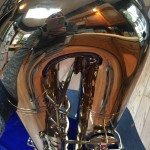
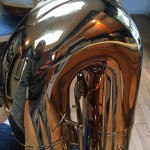
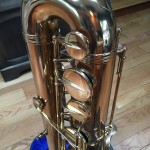

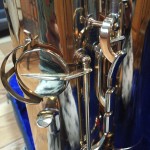
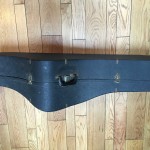



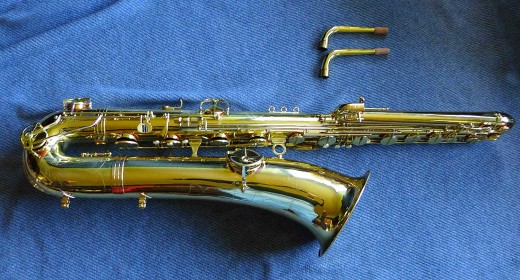
Update: This Beaugnier-made Vox bass vanished off eBay a day before the auction was scheduled to end, because it “…the item is no longer available.”
My guess is that the store sold it off eBay.
A citation from cymru97 (saxontheweb 2013):
” I moved from a Conn stencil to a Beaugnier for the convenience of the size, and quite frankly, heard very LITTLE difference in “volume” or “boom” when using my old Conn Eagle piece. I’m leaning towards the belief that the mouthpiece style and player’s technique play a much larger role in the fundamental tone than the wrap does. That said, I haven’t tried a Selmer or Vandoren piece with the Beaugnier to really explore that suggestion. I don’t feel I’ve given up anything substantial shifting to the compact wrap.”
My comment on this citation is that there still could be a difference in sound for other players.
As there is a difference in bore and bend width that should make a difference, when you have enough lung power.
In theory the small wrap gives more resistance as the bends are in pipes with a smaller diameter, but as long there are no short wraps with the bore of a Buescher we do not know how the wrap affects sound.
I would like to try a short wrap with my modified Runyon pieces that work well on my Buescher. I know what kind of sound I get on the vintage American horns, so this would be a true comparison. However, short of this kind of side by side recorded compare/contrast, all conversations remain theoretical. I’m not aware of this sort of recording existing. Maybe someone has done one already. I should search around and see if I can find one. Then perhaps we would have our answer.
Hi Helen,
PM Woodwind have not updated their website. I now own the horn that they still show on the site.
My experience:
I picked this horn because I wanted keys to high F for soloing, and because I liked the improved ease of handling compared to the larger American horns (I had a line on a very nice Buescher at the same time). I played the horn extensively and have done so since acquiring it. I’m currently using it mostly in two settings: playing baritone parts in a big band; and playing bass lines for a Dixie group.
I have not found any trouble in projecting quite effectively with the Noblet. To me, at least, I don’t think I gave up depth and power of sound with the short wrap design compared to the American style.
There are some “interesting” intonation characteristics here and there, and I have installed some crescents to get low D and low C# down in pitch (easily reversible). I’m also still working a bit on mouthpiece selection. I am still working on getting the sling/strap/harness thing figured out as well.
I have been unable to get any altissimo out of the horn at all so far, unlike the Buescher on which I could easily play all the way up to high A right off the bat. However, I am a weak altissimo player, and I also don’t think it will be something I want often on bass. Except sometimes the baritone parts make me wish I could eke out a high F#.
I think the rap on the short wrap horns is that they don’t have a strong sound compared to the American, plus all the other factors you describe above, and that drives the slow sales (I think all bass saxes sell slowly, anyway.) But to me they are a reasonable alternative.
Hi JC. Welcome to my website.
Thanks for taking the time to reply to this post about Beaugnier bass saxophones. You are part of select few who own this beasties, but those who like them, like them a lot.
Everything you say about the horn, lines up with what others who actually own them say.
As far as your altissimo problems go, that is perhaps a bit peculiar, only because the general rule is: the larger the instrument, the easier the overtones are to play. It might be as simple as getting a more open MP. What are you using? If you aren’t yet a member on the Bass Sax Coop, I would suggest you join and ask the members there. There are some Beaugnier players who belong to the group, so that would be a logical place to get some input.
There are also players there who can share their strap/slip/harness ideas with you. Personally, I only play mine in a stand. I use the fully adjustable stand from Andreas Kaling. It allows you to play your horn from both a stand and sitting position.